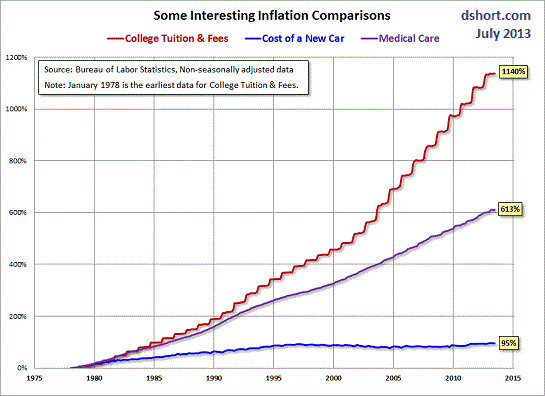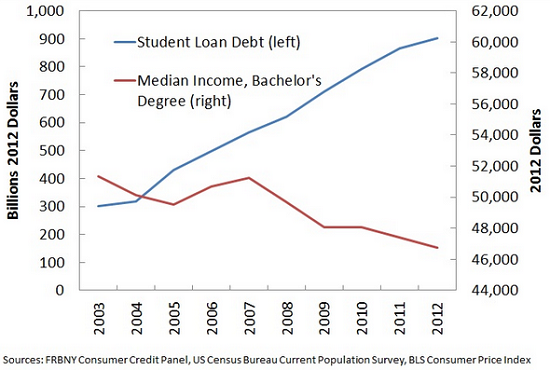It's obvious that we desperately need a new decentralized, individualized and far more productive system of education.
I have long held that America's educational system is an outmoded "factory model" designed to produce interchangeable industrial and service workers en masse for an industrial economy of factories and a 1960s-era service sector that needed millions of employees with basic-skills:
Is Our Education System Based on a Factory Metaphor? (November 15, 2005)
Our "factory model" funnels hundreds or thousands of students into set courses within large mechanistic plants, regardless of their individual attributes, strengths and weaknesses. Like an assembly line of manufactured items, some students are "rejects" who couldn't make the "quality control" grade, and they're thrown on the scrap pile.
what if a kid has no aptitude in math but is a near-wizard in metal-working? Do we scrap him because he didn't meet some factory-defined narrow standards for "knowledge worker"?
What about all the jobs which aren't in biotech and technology? What if we required basic understanding of making meals with real food rather than the processed contents of a box? What if we required kids to know how to fill out a Schedule C form (small business) for a tax return, or change the oil in their car, or install shelving, or fill out a loan application and understand credit, adjustable rate mortgages and deductibles in insurance policies? Aren't these skills more productive for the vast majority of workers than advanced math?
Perhaps the factory metaphor is precisely the wrong one in a rapidly evolving global economy. Maybe instead of cramming all kids into narrow channels of "competence," we should actively filter out kids whose skills, interests and strengths lie elsewhere than math and science: the culinary arts, graphic arts, marketing, welding, etc., all skills which cannot be shipped overseas as readily as those lauded "knowledge worker" skills of programming.
If a child finds math easy and interesting, then by all means let's encourage him or her to reach the highest levels of math and science. But if a child's strengths and talents lie elsewhere, let's replace the factory model with an individualized, tailored apprenticeships in which he or she can thrive and acquire skills which are just as valuable to our society as a whole as advanced math and science.
It's worth recalling that Steve Jobs' brief college career included a hands-on workshop in calligraphy. That apparently impractical interest, as we know, led directly to the Macintosh computer's built-in fonts and the desktop publishing revolution which Jobs' Apple Computer single-handedly launched in the late 1980s.
Can you calculate the value of what would have been lost if Jobs hadn't been free to follow his non-STEM interests? My own guess is hundreds of billions of dollars in software, hardware and improved productivity.
Technology is now enabling personalized learning that helps each student master the one absolutely essential skill: learning to learn on their own.
A recent critique, Reskilling America: Learning to Labor in the Twenty-First Century, discusses how to fix the costly disaster of funneling every child into a four-year college program. The thinking behind this catastrophe was idealistic: our goal should be to give every child a college education, so that "no child is left behind."
There are two fatal flaws in this idealistic thinking:
1. Funneling every child into a horrendously costly four-year university has stripped our economy of all the skills that aren't taught in college: welding, pipefitting, etc.
Reskilling America argues that we have purposefully let our practical-skills education decline in favor of the highly impractical goal of issuing millions of diplomas in gender studies, environmental studies, etc., four-year degrees that qualify the graduate to work in coffee shops or as Uber drivers.
Even STEM (science, technology, engineering, math) degrees appear to be mismatched with the real-world job market in terms of what employers want students to know and the number of jobs in STEM that are actually being generated.
Evidence suggests that the number of tech/STEM jobs has remained constant for years, undermining the assumption that graduating 1 million STEM grads magically creates 1 million new STEM jobs in the real world.
2. Most students gain little of value from their four years of squandering $100,000+.
These charts illustrate the costs and diminishing returns:
The yield (in earnings) on the increasingly unaffordable college degree is declining sharply:
This idealistic goal has created a vast racket--higher education--that deliverslimited or no learning for a large proportion of students.
In all, from 1987 until 2011-12--the most recent academic year for which comparable figures are available—universities and colleges collectively added 517,636 administrators and professional employees, according to the analysis by the New England Center for Investigative Reporting.
“There’s just a mind-boggling amount of money per student that’s being spent on administration,” said Andrew Gillen, a senior researcher at the institutes. “It raises a question of priorities.”
The ratio of nonacademic employees to faculty has also doubled. There are now two nonacademic employees at public and two and a half at private universities and colleges for every one full-time, tenure-track member of the faculty.
The number of employees in central system offices has increased six-fold since 1987, and the number of administrators in them by a factor of more than 34.
The technology and tools already exist to accredit the student, not the institution and provide distributed courses, adaptive learning and real-world, workplace-based workshops for a tiny fraction of the cost of the ineffective, unaffordable factory model of higher education we are currently burdened with.
Once costs decline 95%, there is no need for student loans or the bloated bureaucracies currently overseeing the parasitic student-loan system.
Once we accredit the student, not the institution, existing universities will compete directly with Nearly Free Universities not in issuing diplomas but in how much students actually learn and master. If students can learn as much or more for $5,000 (including workshops in real-world workplaces) than they do for $160,000 in conventional universities, then the sectors of higher education that charge $160,000 for a 4-year degree will vanish.
In essence, technology has leapfrogged the outmoded, ineffective, unaffordable factory model. It's time to scrap the factory model (optimized for 1960) and create an individualized apprenticeship model that accredits the student, not the institution--a model optimized for the 21st century economy.
NOTE: Contributions/subscriptions are acknowledged in the order received. Your name and email remain confidential and will not be given to any other individual, company or agency.
Thank you, Augustine M. ($5/month), for your wondrously generous pledge to this site -- I am greatly honored by your support and readership.
| |
Thank you, Thomas L. ($50), for your splendidly generous contribution to this site -- I am greatly honored by your support and readership.
|


























